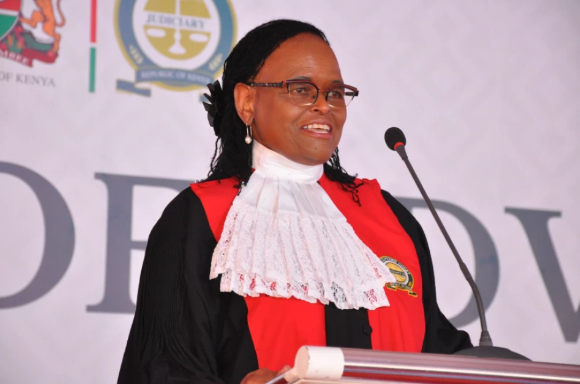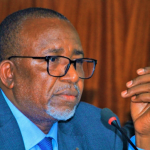Chief Justice Martha Koome has instructed Magistrates’ Courts nationwide to conduct Rapid Results Initiatives to resolve cases pending for over three years. She delivered the keynote speech virtually at the start of the 11th Annual Heads of Station Forum, urging courts to prioritize active case and docket management strategies.
“It is active case and docket management that will help reduce case backlog by ensuring timely delivery of justice and management of our caseload,” she emphasised.
She highlighted the importance of digital-ready courts and the uptake of ICT for streamlining processes and making justice more accessible.
“Robust data will guide our strategies and ensure our initiatives have the intended impact. We are therefore using technology to enhance accountability of our processes and to get reliable performance data that ensure informed and evidence-based decision making,” she told magistrates attending the meeting.
Koome commended the performance of Magistrates’ Courts in the first nine months of the 2023/24 Financial Year, having resolved 281,211 cases compared to 289,576 cases filed in the same period, attaining a Case Clearance Rate (CCR) of 97 per cent.
The CJ emphasised the need to strengthen specialised courts, including Children’s Courts, the Sexual and Gender-Based Violence Courts and the Small Claims Courts, saying their distinctive roles in addressing unique justice questions amplify the impact of justice in the society.
She called for active pursuit of prison decongestion by ensuring that Community Service Orders (CSO) Case Committees are included as a standing item in the Court Users Committee (CUC) meeting agendas.
“I wish to bring it to your attention, that going forward, we will intensify initiatives to reduce prison overcrowding as a measurable target in our Performance Management and Measurement Understanding (PMMU),” CJ Koome indicated.
Chief Registrar of the Judiciary Winfridah Mokaya stated that there would be greater involvement of Judicial Officers and staff at the station level in the budget making process, improvement of infrastructure, mentorship, and peer review.
She emphasized the importance of embracing intergenerational leadership to guide each other, particularly the younger team members.
“Embrace intergenerational leadership to guide each other, particularly the younger team members in your station. I would encourage you to walk the talk yourself and create a framework for mentorship and peer review within your station. Be your brother and sister’s keeper.”
Mokaya highlighted her core priority to support the Chief Justice in delivering on the STAJ agenda, improving management of Judiciary resources.
Kisii Governor Simba Arati, attending the opening session, mentioned that his county has developed a child protection policy approved by the Cabinet and pending approval by the County Assembly.
“The policy seeks to institutionalise the social protection and welfare of the child. The policy would provide a frame work for implementation of child protection responsive and preventive services in Kisii county, a road map for collaboration and partnership with State and Non state actors for child protection in Kisii, strengthening the existing systems as well as establishment of new structures for the social and economic empowerment and protection of children.”
He assured the Judiciary that the county has identified and set aside land and premises for building courts in three more sub-counties to bring justice closer to the people.
“I am pleased to inform you that the premises and paperwork is now ready. In our view, the premises are sufficient to equally house a Mediation Centre as well as the Small Claims Court.”
Governor Arati pledged to work with the Judiciary in the rollout of Alternative Justice Systems (AJS) to improve access to justice at the grassroots level.



